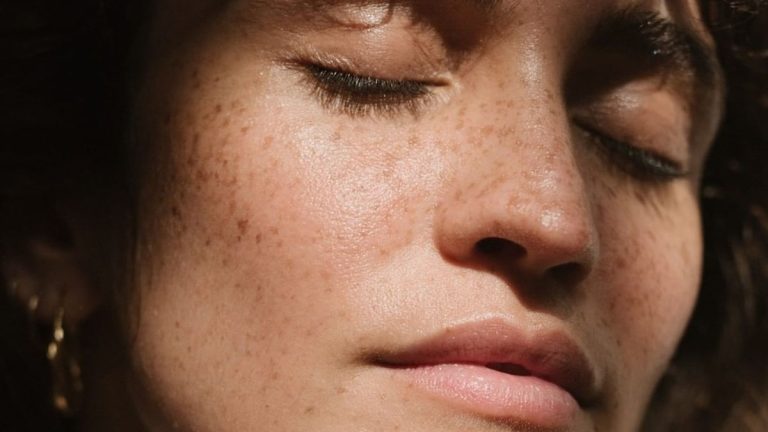“I believe that pharmacy is a point of reference and trust in Spain“, begins Mercedes Marcos, pharmacist and founder of cosmetics firm Quinque, when asked about eating habits. the beauty Spanish and French. As a Spaniard living in the city of light, the expert assures that in our country there is a strong belief that “shopping at the pharmacy We know that the person who recommends this product to us is a health professional.“. We tell you what other differences experts observe and what lessons we should learn from each other.
On the importance of choosing your trusted pharmacy well
“The pharmaceutical industry has created a boom In recent years and suddenly We have such an exaggerated overload of information which sometimes leads us to use products that are not suited to our skin type,” says Mercedes, alerting us to a current problem. “It’s something that It made us go back to the pharmacy So that whoever consults us can analyze our skin and recommend a personalized routine,” she reveals.
Pharmacist Mencia Hermosa, founder of Bloom by Mencia, agrees with Mercedes that the image of the pharmacy and the pharmacist if we talk about skin care. “Skin is the largest organ and it needs specific care; and even if it is healthy, we must protect it adequately, not only to avoid premature signs of aging, but also to avoid some pathologies mainly arising from external factors such as solar radiation,” he recalls. “The pharmacist knows the skin, its properties and characteristics, the process of all pathologies (acne, hyperpigmentation, rosacea, dermatitis…) and how to treat it,” he defends. Mencia Protects the pharmacist’s role as a healthcare worker But then Why is the trend of shopping in pharmacies not so deep in France?
That’s why French women don’t buy (as much) at the pharmacy
According to Mercedes Marcos, “There are many other actors in the beauty industry in the French market refers to the Spanish market”. “pharmacies are different”he pointed out. Granted that in small cities like Leon, the pharmacy concept is closer to what we see in Spain, and yes beauty routines do have this advice, but in big cities like Paris it’s rare to see this kind of personal attention. .
Furthermore, experts tell us that in France, The niche cosmetic store concept is much more establishedAnd almost always, the people in charge of these businesses are cosmetologists, aesthetic professionals and even pharmacists with special training in cosmetics so they know the products and the skin well. “I think that’s kind of the selling point Pharmacy has become more important than sales of cosmetics For this reason in France, pharmacies have stepped up and are now starting to offer more “modern” and people who are truly specialized in this sector.” The pharmaceutical company foresees the evolution of the French pharmacy’s cosmetic offer in the coming years.
A reassuring common denominator
The European Cosmetic Regulation (Regulation (EC) nª1223/2009) is the most stringent that exists. This has been confirmed by Mercedes Marcos. “There are many products from other continents that cannot be delivered to Europe. Because they do not comply with these regulations,” he points out. He emphasizes that all products on the market, whether sold in pharmacies or in any other sales channel, have passed the same regulatory tests and are safe. For the user.
Mencia Defines European as a “harmonized” regulation. It tells us something important and that is that it is being updated in light of new information and scientific research. “Before any cosmetic product is marketed, an ingredient safety assessment is done,” he assured. “Furthermore, toxicology, frequency of use of the product, area of application and average amount applied to the population for which the product is designed are taken into account,” he told us, citing some of the requirements now established.
To this we must add that, as Mercedes points out, there are other types of tests that are not mandatory and that very few brands do, which They are called performance tests To evaluate the actual performance of the products we put on the market. “What separates some products from being better than others is the quality of their ingredients, innovation and formulation,” he notes.
This is how Spanish women take care of their skin and this is how French women take care of their skin.
Mercedes believes that the biggest difference is in habits skin care Spanish and French that is They attach great importance to the fact that cosmetics are naturalBIO, etc. “In Spain we give it less importance, and I think it’s something very wise, since the fact that a cosmetic is natural does not mean that it is safe or good,” he clarified. Additionally, both he and Mencia point out other differences:
- The French are very basic in their beauty routines: Good cleansing and good hydration are the foundation of everything, and consider skin care as part of your health care.
- The practice of using protection in Spain is well established Solar every day, though there’s still work to be done.
- The Spanish company is looking for “all-in-one” products: If a single product can solve the problem, better than three.
- Complementary practices among Spaniards are still difficult. Gradually, thanks to publicity on the network and in other media such as the press, it is becoming more and more normal.
French and Spanish we have a lot to learn From each other but also interested in discovering how skin care differs culturally.





